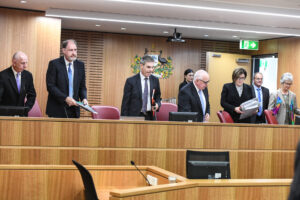Share
Workers produce more, but get paid less. Business invests less in real capital, but their profits grow. Technology advances at breakneck pace, but so many jobs are degraded and menial (not to mention horribly paid). What gives? Australia’s labour market truly seems “upside down.”
In this article reprinted from Western Teacher magazine (published by the State School Teachers’ Union of WA), our Director Jim Stanford tries to explain these contradictory trends.
The article is based on a presentation to a recent SSTUWA delegates meeting in Perth.

Stanford provides a dual diagnosis for Australia’s labour market problems: an inadequate quantity of work, and the deteriorating quality of work. Egged on by government policies which have deliberately suppressed wages in so many workplaces, wage growth has fallen to postwar lows. This is now undermining Australia’s continued economic progress.
In addition to diagnosing what’s gone wrong in Australia’s labour market, Stanford also explains the numerous economic benefits of stronger collective bargaining systems so that workers can receive a fairer share of the economic pie: stronger consumer spending, more stable financial conditions, stronger government revenues, and less inequality.
To see the full issue of Western Teacher, or sign up for future editions, please visit the magazine’s website. We are grateful to Western Teacher for permission to reprint the article here!
Related documents
You might also like
The continuing irrelevance of minimum wages to future inflation
Minimum and award wages should grow by 5 to 9 per cent this year
Want to lift workers’ productivity? Let’s start with their bosses
Business representatives sit down today with government and others to talk about productivity. Who, according to those business representatives, will need to change the way they do things?
Centre For Future Work to evolve into standalone entity
The Centre for Future Work was established by the Australia Institute in 2016 to conduct and publish progressive economic research on work, employment, and labour markets. Supported by the Australian Union movement, the centre produced cutting edge research and led the national conversation on economic issues facing working people: including the future of jobs, wages



